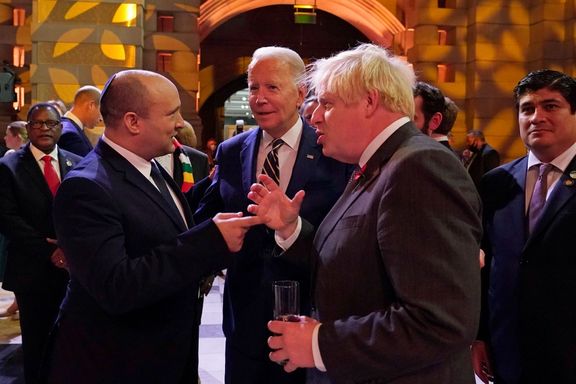Israel's Bennett Discusses Iran With World Leaders In Glasgow

Israeli Prime Minister Naftali Bennett had meetings with world leaders in Glasgow, discussing Iran's nuclear issue, and advising them to be tough with Tehran.

Israeli Prime Minister Naftali Bennett had meetings with world leaders in Glasgow, discussing Iran's nuclear issue, and advising them to be tough with Tehran.
Israeli media report quoting sources that Bennett had many productive meetings during the world climate summit in Glasgow, where other leaders were interested to know Israel’s opinion about how to deal with Iran and its analysis on Tehran’s intentions.
The Israeli prime minister had long talks with French President Emmanuel Macron and British Prime Minister Boris Johnson. The Times of Israel reported that discussions about Iran revolved two major issues – “what world powers can do to change Iranian behavior, and what Israel is doing independently.”
Iran suspended negotiations with world powers in June and has not returned to Vienna where six rounds of talks took place starting in April. Iran’s new hardline government is increasingly adopting a tougher posture that intends to change what was already agreed and perhaps even the established process whereby the United States was negotiation indirectly with the Iranian delegation.
A source told The Times of Israel that “There is a feeling in the world something has to happen,” and other countries want to know what Israel thinks.
Israeli media are also reporting that Bennet advised other leaders to be tough with Tehran, while most are thinking to use the traditional carrot and stick approach to coax Iran to play by diplomatic rules and reach an agreement on reestablishing limits to its nuclear program.
Meanwhile Bennett tried to solidify Israel’s strengthening ties with regional and Asian countries. He accepted an invitation to visit India and he invited Bahrain’s Salman Al Khalifa to visit Israel, an invitation he accepted.
Jerusalem Post reported that Bennett told world leaders to put more pressure on Iran, taking a hard line in the UN Security Council and in the International Atomic Energy Agency (IAEA).
Iran has reduced its cooperation with the UN nuclear watchdog this year but Western countries decided in the September meeting of the agency’s board of governors not to table a censure against Iran.
Bennett also reiterated Israel’s argument that without a firm plan to prevent Iran from obtaining nuclear weapons it would be a mistake to lift sanctions, giving Tehran a financial lifeline that it can use to finance its malign activities in the region.
US officials believe a drone attack in October on a US base in southern Syria was supported and “encouraged” by Iran, and last Friday the Treasury Department announced sanctions against Iranian officials and entities that assist its military drone program.
The Soufan Center, a counterterrorism and anti-extremism think tank reported on Tuesday that Iran is increasingly willing “to take direct military action against its adversaries” and force the US out of Iraq and Syria to be able to have free access for resupplying Hezbollah in Lebanon.
The report said, “It can be argued that the U.S. withdrawal from Afghanistan in August has led Iranian leaders to assess that direct U.S. military pressure can compel the United States to withdraw from the region completely.”